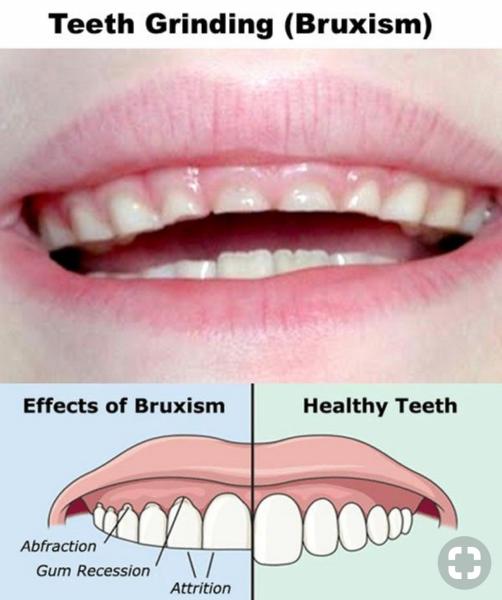Kids and Grinding
Effects of Bruxism
By Brianne Jones, RDH
Kids and Grinding!
A peaceful, sleeping child is the best kind, right?! Sure, but...truth is, often times kids grind their teeth and you are left hearing that awful, "nails on the chalkboard" sound where your skin begins to crawl! ha! Well, Bruxism (the fancy term for grinding of teeth or jaw clenching) is actually quite common and sometimes educating yourself on potential causes, can help with eliminating and treating it!
Experts aren't always sure why bruxism happens. In some cases, kids may grind because the top and bottom teeth aren't aligned properly. Others do it as a response to pain, such as from an earache or teething. Kids might grind their teeth as a way to ease the pain, just as they might rub a sore muscle. Many kids outgrow these fairly common causes for grinding.
Stress usually nervous tension or anger is another cause. For instance, a child might worry about a test at school or a change in routine (a new sibling or a new teacher). Even arguing with parents and siblings can cause enough stress to prompt teeth grinding or jaw clenching.
Some kids who are hyperactive also have bruxism. And sometimes kids with other medical conditions (such as cerebral palsy) or who take certain medicines can develop bruxism.
Sometimes teeth grinding can go unnoticed and the child may not have any side effects. Other times, bruxism can leave a child with severe sensitivity, lack of enamel on the teeth, a chipped tooth, and even can lead to TMJ problems and severe earaches.
Treating Bruxism
Most kids outgrow bruxism, but a combination of parental observation and dental visits can help keep the problem in check until they do.
In cases where the grinding and clenching make a child's face and jaw sore or damage the teeth, dentists may prescribe a special night guard. Molded to a child's teeth, the night guard is similar to the protective mouthpieces worn by athletes. Though a mouthpiece can take some getting used to, positive results happen quickly.
Helping Kids With Bruxism
Whether the cause is physical or psychological, kids might be able to control bruxism by relaxing before bedtime for example, by taking a warm bath or shower, listening to a few minutes of soothing music, or reading a book.
For bruxism that's caused by stress, ask about what's upsetting your child and find a way to help. For example, a kid who is worried about being away from home for a first camping trip might need reassurance that mom or dad will be nearby if needed.
If the issue is more complicated, such as moving to a new town, discuss your child's concerns and try to ease any fears. If you're concerned, talk to your doctor.
In rare cases, basic stress relievers aren't enough to stop bruxism. If your child has trouble sleeping or is acting differently than usual, your dentist or doctor may suggest further evaluation. This can help find the cause of the stress and a proper course of treatment.
